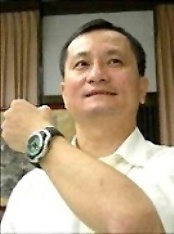|
"Resistance is futile!" Is it possible that the BORG cybernetic technology portrayed in the Star Trek series will be available for use in the near future? The answer is, "Yes, it will!"
Recently, an NTU research team—Prof. S.S. Lu, College of Electrical Engineering and Computer Science; Profs. L.S. Huang and C.K. Lee, College of Engineering; Prof. S.M. Lin, College of Medicine; Drs. Y. H. Wang and N. K. Chou, NTU Hospital—developed a similar concept by testing a wireless bio-MEMS sensor for use in field disease screening and early detection outside the hospital.
Recent studies show that high levels of C-reactive protein (CRP) in the bloodstream indicate risk of heart attack and emergent colon cancer. Patients with heart infarction or ischemic stroke need continuous monitoring of their CRP levels, so doctors can screen recurrent or high risk mortality situations in time. Such continuous follow-up requires a reusable protein sensor. In addition, since the ability to monitor patients’ health at home or work improves their quality of life significantly, wireless portable sensors that might be worn or implanted are also desirable. However, the traditional disease-related protein sensors using MEMS cantilevers can only be reused with strong acids, so they are too dangerous to be worn or implanted. Consequently, the NTU research developed a bio-MEMS CRP sensor using electric signals that can be reused safely and easily. A wireless chip has been designed for this sensor to facilitate wireless links. Since this wireless sensor can be used by field medics and even laymen, it can be used, not only for continuous monitoring of a patient’s condition, but also for detecting the breakout of contagious diseases in airports, on battlefields or in disaster situations, such as tornadoes, tsunamis, earthquakes, etc., far from well-equipped hospitals. Besides disease detection, the technology developed by this NTU team can be applied in drug and medical R&D at low cost because of it is generic, allows mass production and is safely reusable. |
|
Recent advances in MEMS and wireless technologies enabled the NTU research team to develop a safe, reusable, generic bio-sensor for the detection of specific disease-related protein concentrations in the bloodstream in real-time fashion. These sensors measure protein concentration using a tiny drop of blood. Generic and reusable, each device can be used on large populations to screen for disease or on individual patients to monitor their condition continuously. Equipped with wireless technology, the sensor can be used by medics or trained laymen to undertake screening just using a small portable device, without complex gauges, test tubes or laboratory instrumentation. This portable device would be an ideal tool for low-cost large-scale disease screening in adverse conditions without medical resources. |
Professor S.S. Lu personally demonstrates their successfully researched and developed watch-sized C-reactive protein sensor.
|



